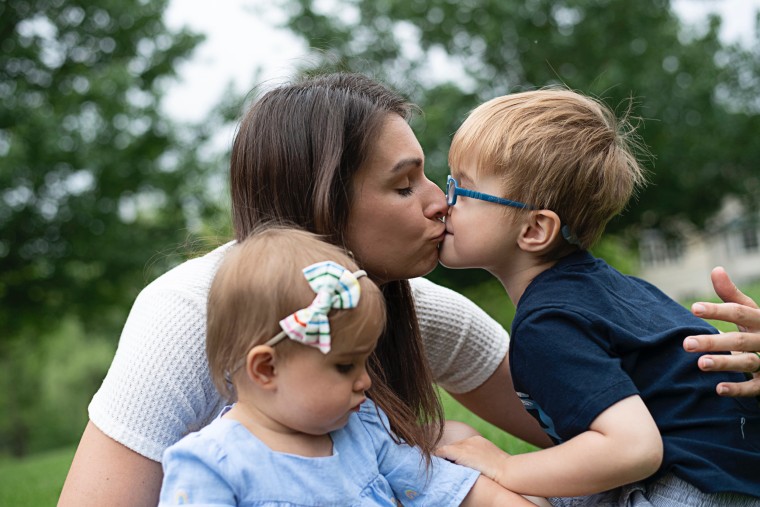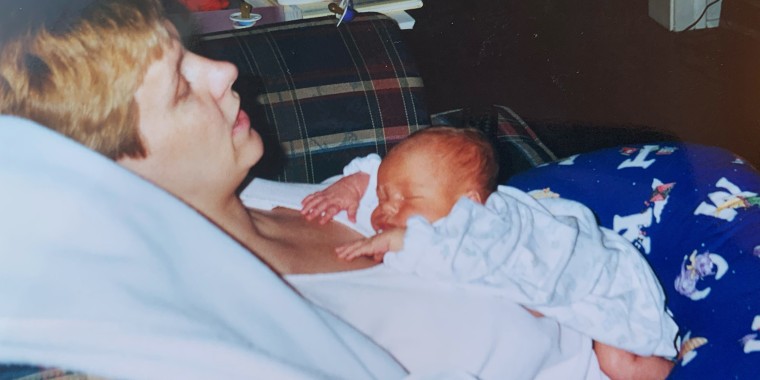After trying to have a second baby for more than a year, Natalie Connolly felt disbelief that she experienced postpartum depression. The pregnancy and birth were much easier this time around and she tried so hard to get pregnant with a second child, now 16-months-old.
“I would wake up in the morning and I would literally start crying. I would be like, ‘I don't want get up. I don't want to do this today,’” the 30-year-old therapist from Canonsburg, Pennsylvania, told TODAY Parents. “I wanted a second baby for so long. The guilt was just awful because I wanted this. Why do I feel like this?”

She eventually told her OB-GYN who referred her to a psychiatrist and therapist for treatment. Even still, she sometimes experiences worrisome symptoms.
“I have come to terms with it, that this might be a lifelong thing. It might not,” she said. “But I just want to have a good life, I want to be happy. I want my kids to be happy.”
Connolly's experience with longer-lasting postpartum depression isn't unusual. When Nicole Knepper gave birth to her son, she never “found her footing” as a new mom. The hospital didn’t have a lactation consultant and she struggled to breastfeed. She developed mastitis, painful breast swelling, her son was colicky and her husband was in graduate school. She felt anxious all the time and she dropped a lot of weight.
“I had all the thoughts that scare you to death and you don’t want to tell somebody,” Knepper, 50, of the Chicago area told TODAY Parents. “I might have waited a little too long (to get help) because I wanted to keep trying and handling it myself.”

As the symptoms lingered past three months, she did eventually talk to a therapist and revealed just how upsetting her thoughts had become.
“I said, ‘I’m having visions of hurting him, leaving him on the side of the road. I think he’d be better off with me. I want to die,’” she recalled.
Postpartum depression might last longer
Knepper spoke with a therapist and took medication to treat her postpartum depression and anxiety. Even though she received help, it took years before she felt better.
The experiences of Knepper and Connolly might be more common than previously understood. A recent study indicates that women can have postpartum depression and anxiety anytime up to three years after delivering a baby. Experts say they understood that postpartum depression lasts longer than expected and can start later but the study provides more evidence.
“This is absolutely something that we know and something I see every day: Women coming either with persistent symptoms beyond the year postpartum — or more — or even presenting a bit later,” Dr. Andrea Favini, a psychiatrist at Pittsburgh's Allegheny Health Network told TODAY Parents. “It's really important to have studies like this to really show that there is variation and how symptoms progress over time.”
Dr. Samantha Meltzer-Brody agrees, but adds the paper doesn’t explain whether the women’s symptoms were missed, and they were diagnosed later, or if the symptoms simply appeared later.
“For some women, the onset of postpartum depression is likely to be more chronic and persistent,” the director of the University of North Carolina Center for Women’s Mood Disorders told TODAY Parents. “One of the things we don't know about this is how many of these women were depressed before pregnancy?”
Favini notes that in the Diagnostic and Statistical Manual of Mental Disorders 5 (DSM5), the perinatal mood disorder period is only four weeks after birth. The American College of Obstetricians and Gynecologists notes that postpartum mood disorder can last or start any time up to a year after birth. But Favini says even in later stages some moms feel tremendous guilt when they experience onset later.
“Women who are presenting to treatment a little bit later or their symptoms are coming up almost two years postpartum — they think this can't possibly be postpartum depression,” she said. “It's really validating to have a broader definition of the perinatal period.”
The findings can help both women and doctors better understand how pregnancy impacts mood disorders in the long run. The changes that occur to women during pregnancy and birth don't magically disappear by a set date of six months or a year, yet that's often when screening ends.
“The strength of the study is that you have 5,000 women tracked over time and what it suggests is that certainly the experience of being a mother during those few years postpartum is a challenge,” Meltzer-Brody said. "We should be giving more support to women and mothers."
Finding help
It wasn’t until Knepper’s son was nearly 3 years old when she felt the postpartum depression and anxiety went away. She says the death of her father “snapped” her out of it.
“I was like, Alright, what is the worst thing that can happen? You know, the thing that everyone fears? That you lose somebody that you love,” she said. “I'm like, ‘Well, that happened.’ … I was able to put things in perspective and it took that life altering loss of my father to just snap me into a mode of humility, gratitude, perspective.”

Knepper, whose son is now 21 and daughter is 16, said she was surprised when the horrific postpartum depression and anxiety did not return after her daughter’s birth.
Connolly hopes that by sharing her story, other women will realize it’s OK if postpartum depression lasts longer than expected and that others will ask for help no matter when the symptoms start.
“I know people suffer in silence. And I couldn’t,” she said. “I just don’t want other women to feel (depressed or anxious) because it is just not a good feeling to have.”